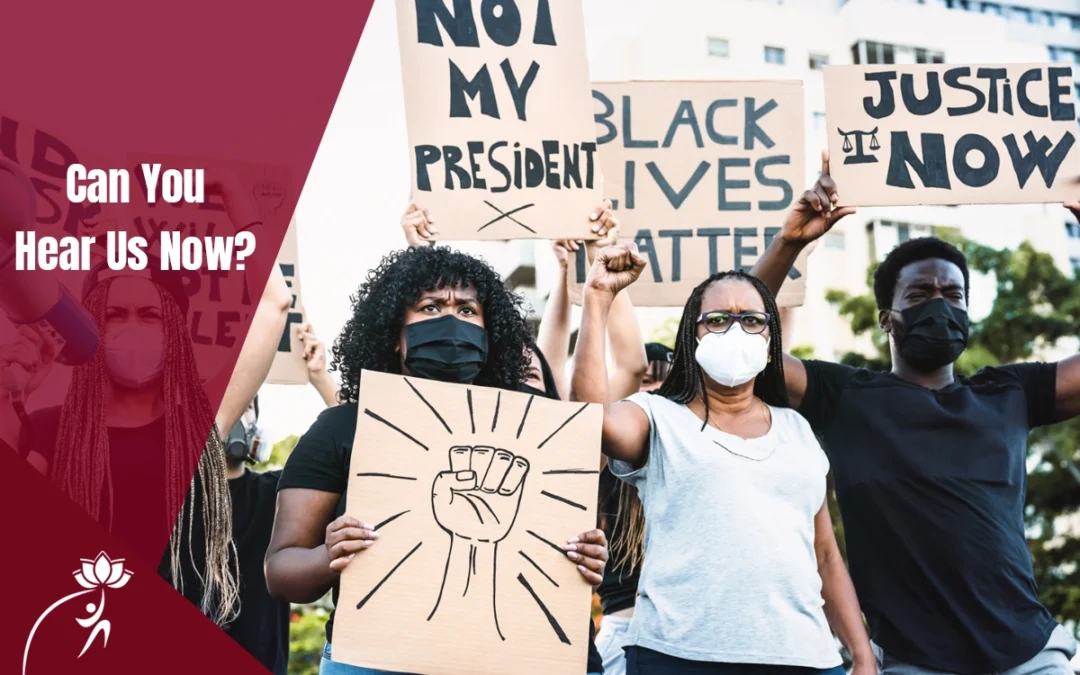The perpetuation of centuries’ old systemic discrimination centered in the ideology of white supremacy and injustices against Black and brown people “weather”1 us, break down our bodies, and deflate our spirits.
We raise our voices in righteous anger because all we have are our voices and rage in a society that devalues us and still, we are unheard and misunderstood. So, we continue to fight, to resist, and to riot, season after season, each time renewing the pain and anguish. And each time, justice is denied.
In 1951, Harlem Renaissance poet extraordinaire Langston Hughes mused, “what happens to a dream deferred? Does it dry up like a raisin in the sun? Or fester like a sore—and then run? Does it stink like rotten meat? Or crust and sugar over—like a syrupy sweet? Maybe it just sags like a heavy load. Or does it explode?”
Tragically, we now know the answers to the questions he asked nearly 70 years ago—it’s ALL of the above. We are traumatized. We are angry at a “dream deferred” almost two hundreds years post-slavery. We are weary and exhausted and bereaved. Who will speak up with us? Who will fight with us? Who will help us carry the load?
This time, our pleas were heard as many witnessed the sheer brutality of an officer of the law so cavalierly denying to Mr. George Floyd the most elemental right of all human beings—the right to breathe—while his fellow officers stood by in complicit disregard. The inhumanity, captured so graphically by the lens of a 17-year-old girl who knew something was terribly awry, struck a deep chord within our collective conscience and catapulted us into action. Black voices amplified as allies joined us in a massive multi-racial coalition. We were not—are not—alone.
Thank you for showing up all across the country (and internationally, too!) in mass protests against police brutality of Black people and institutional racism, and for policing reforms. We support peaceful protests—destruction of property and looting are perversions of our cause and distract from what drove us into the streets in the first place amidst the COVID-19 pandemic that is disproportionately killing us. (Yet another glaring indicator of the ugly underbelly of systemic inequality and the grueling, unrelenting toll it exacts on our daily lives.)
If you can really hear us now, I appeal to you to partner with us towards a just, inclusive, equitable, anti-racist society. Here are a few immediate (and ongoing) actions you can take:
- Practice radical self-interrogation: How would you truly know that you don’t harbor racial bias or animosity? What’s your metric beyond the superficial consumption of Black culture? None of us, including Black people, is exempt from bias thinking and behavior especially as citizens in a society whose very foundation was built on racial and gender hierarchy, violence, and exclusion of non-white human beings, and whose institutional practices, such as policing, derive from this premise. So, yes, do question your own views, assumptions, values, and practices on race. This moment demands that you be anti-racist rather than non-racist—the former suggests a firm, intentional commitment to rooting out racism wherever it rears it ugly head while the latter allows for a feel-good, self-righteous, self-exoneration. Be an active part of the solution for transformative change.
- Self-Educate: How familiar are you with the American history of Black people? What’s a seminal text you can point to for clarity and perspective? Now’s the perfect time to create a new reading list! One vitally critical institution you might want to become familiar with is the Schomburg Center for Research in Black Culture—NYPL located in Harlem, New York. The library boasts an extensive archive on Black history and you can access some of the archive online. The Center has just published its Black Liberation Reading List. Check it out!
- Listen More, Speak Less: As you join forums, assume an inquiry stance and listen to understand. Pay attention to how you feel in these spaces and where your thoughts go. This feedback will give you an indication of what’s being triggered in you and the internal self-work you may need to undertake. Participate in discussions at your workplaces, too. If none exist, have the courage to start one and frame by sharing your best intentions, growth areas, and goals. Be proactive and have faith. Change takes time.
- Policing Reform: This is the inflection point at the moment. If this cause is important to you, take the time to study and seek out leading organizations and key people who have been engaged in the work. Here are a few resources to get you started:
- Bryan Stevenson: his book Just Mercy: A Story of Justice and Redemption, and his Equal Justice Initiative
- Sherrilyn Ifill, President and Director-Counsel of the NAACP Legal Defense and Education Fund, Inc.: “Policing Reform Campaign”
- The Obama Foundation: “New Era of Public Safety: An Advocacy Toolkit for Fair, Safe, and Effective Community Policing”
And, of course, we pray and ask that you sign up to vote and show up at the polls in November, too, to root out racism and bigotry. In this moment of national crises, we’ve been gifted a tremendous opportunity to recalibrate and charged with a moral mandate: “We must interrogate, dismantle, and reimagine every system in our society that sanctions and perpetuates oppression, injustice, and the deaths of Black people. Black Lives Matter.”2 Stay the course with us. The struggle to victory is long and maddening.
We need rest now. We need restoration. We need peace. We need justice.
My people, sit and rest awhile. Grieve. Restore. And then, fight on! A new day is dawning. Hold on.
Onward in Victory!


1. Following decades of research in and with high-poverty communities, in 1992, researcher Dr. Arline Geronimus coined the term “weathering” to describe the “physiological process that accelerates aging and increases health vulnerability. It is spurred by chronic toxic stress exposures over the life course and the tenacious high-effort coping [that] families and communities engage in to survive them, if not prevail.” Weathering helps us understand how “lived experiences such as racial inequality and gender discrimination become biology.”
2. “None of Us Can Afford to Stand Silent,” June, 2020 publication of the Brooklyn Community Foundation
About Glenda M. Francis
Glenda M. Francis is the founder of Audacious Inner Works Institute, a personal development and capacity building service organization. She is an ICF credentialed life coach specializing in confidence building and women’s wellness and power.

